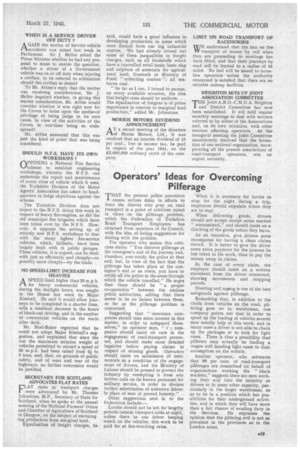Operators' Ideas for Overcoming Pilferage
Page 21

If you've noticed an error in this article please click here to report it so we can fix it.
THAT the present police procedure
causes serious delay in efforts to trace the thieves who prey on road transport is a point of criticism raised in views on the pilferage problem, which the Federation of Yorkshire Road Transport Employers has obtained from members of its Council, with the idea of listing suggestions for dealing with the problem.
The operator who makes this criticism states: " You discover pilferage at the consignee's end of the journey and, therefore, you, notify the police at that end; but, in view of the fact that the pilferage has taken place at the consignor's end or en route, you have to notify all the police in the areas through which the vehicle travelled." He urges that there should be ." a proper co-operation " between the various police authorities, adding that there seems to be no liaison between them, so far as the pilferage problem is concerned.
Suggesting that " insurance companies should take more interest in this matter, in order to safeguard themselves," an operator says, " t' companies should insist on care in the engasement of road-transport person. nel, and should make more detailed inquiries before paying claims in respect of missing goods. Operators should insist on submission of testimonials as a condition of the engagement of drivers, and the Ministry of Labour should be pressed to protect the industry by exempting it from any further calls on its known personnel for military service, in order to obviate further substitution of unknown labour In' place of men of proved honesty."
Other suggestions sent in to the Federation include:—
Lorries should not be left for lengthy periods outside transport cafes at night, unless there be one driver keeping watch on the vehicles, this work to be paid for at fire-watching rates. When it is necessary for lorries to stop for the night during a trip, employers should stipulate where they are to stay.
When delivering goods, drivers should not accept receipt notes marked " unexamined," and should insist on a checking of the goods before they leave.
As an incentive, give drivers some recompense for having a clean claims record. It is better to•give the driver some extra payment for the interest he has taken in his work, than to pay the money away in claims.
In the case of every claim, the employer should insist on a written statement from the driver concerned, showing movements and stopping periods.
Sheeting and roping is one of the best safeguards against pilferage.
Remarking that, in addition to the thefts from vehicles on the road, pilfering goes on in warehouses, one company points out that in order to speed up the loading of vehicles several men usually help in this work, and in many cases a driver is not able to check up the packages or to look for light cases. There is thus a possibility that pilferers may actually be loading a wagon and handing light cases to their accomplices on the vehicle.
Another operator, who estimates that 90 per cent, of road-transport pilferages are committed on behalf of organizations working the " black markets," suggests there are men working their way into the industry as drivers or in some other capacity, particularly in the larger warehouses, so as to be in a position which has possibilities for their underground activities, and in which they will have more than a fair chance of evading duty in the Services. He expresses the opinion that the pilfering evil is not as prevalent in the provinces as in the London areas.




















































